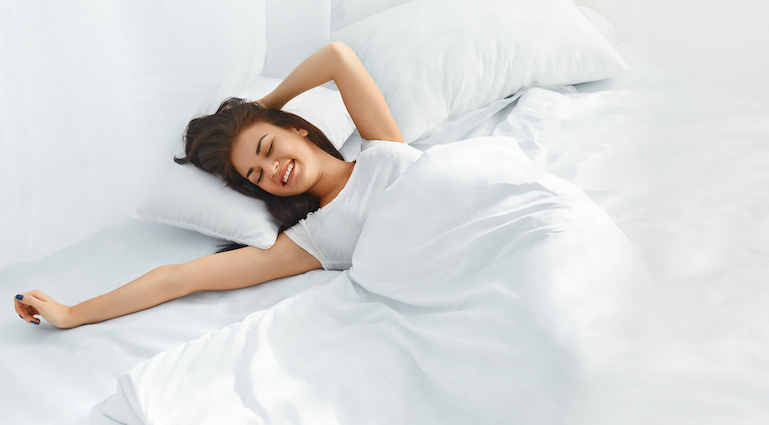What Does the Hurkle-Durkle TikTok Trend Do for Your Sleep?

The sleep-related practice of hurkle-durkling is growing in popularity, largely thanks to TikTok. Despite sounding made-up, “hurkle-durkle” is actually a 200-year-old Scottish term that means “to lie in bed or lounge about when one should be up and about.”
When actress and singer Kira Kosarin made a TikTok video about being a hurkle-durkler, it received over 350,000 likes. A recent tweet by author Susie Dent that defines hurkle-durkle received over one million views and 16,000 likes.
Clearly, people have an interest in hurkle-durkling. But what does the practice mean for your sleep? The answer likely depends on how and why you want to hurkle-durkle.
Hurkle-durkling is similar to the TikTok trend of bed rotting, which many people call a form of self care. The American Psychological Association recently shared an article on LinkedIn about hurkle-durkling and getting extra rest without guilt. But while bed rotting involves lying in bed for an entire day or weekend, hurkle-durkling usually means lingering in bed for a short time after waking up.
People who hurkle-durkle simply because they want to start the day in a relaxed state probably have nothing to worry about. But, if you hurkle-durkle every workday because you don’t feel ready to wake up when your alarm goes off, you might want to ask yourself if you’re falling short on sleep. According to experts, around one-third of U.S. adults don’t get the recommended amount of sleep. People who get enough sleep at night should feel refreshed and alert after waking up in the morning.

The jury is still out on whether hitting the snooze button while hurkle-durkling is helpful or hurtful. Two recent studies came to opposing conclusions. One found that snoozing can reduce morning drowsiness. Another found that hitting snooze leads to feeling tired for longer in the morning. In those cases, getting enough sleep in the first place would likely be preferable to a hurkle-durkle.
A lack of sleep isn’t the only reason a person might want to hurkle-durkle in the morning. While depression can cause insomnia, it can also result in oversleeping. Sleep disorders ranging from narcolepsy to sleep apnea can cause morning tiredness. A strong urge to sleep in late may also stem from issues with the body’s internal clock (circadian rhythms). Hurkle-durkling isn’t a substitute for treatment if you have an underlying mood or sleep disorder.
In fact, in the case of a circadian rhythm issue, hurkle-durkling could potentially make things worse. Exposure to bright light in the morning hours can help you keep a regular sleep schedule so you feel sufficiently tired at night to fall asleep and wake up feeling refreshed in the morning. If you hurkle-durkle for too long, you may miss out on important light exposure and perpetuate the pattern of morning tiredness as a result.
Got a hot tip? Pitch us your story idea, share your expertise with SleepFoundation.org, or let us know about your sleep experiences right here.
References
9 Sources
-
Scottish National Dictionary. (1960). Hurkle. Dictionaries of the Scots Language., Retrieved February 26, 2024, from
https://dsl.ac.uk/entry/snd/hurkle_v1_n1 -
American Psychological Association. (2024, February 19). Hurkle-durkle is a funny-sounding term that puts a positive spin on self-care and taking time to rest. LinkedIn., Retrieved February 26, 2024, from
https://www.linkedin.com/posts/american-psychological-association_what-is-hurkle-durkle-how-the-trend-is-teaching-activity-7164990194755031040-vHbf/ -
Kubota, S. (2023, October 3). What is bed rotting, and is it good for you? What to know about the Gen Z trend. Today., Retrieved February 26, 2024, from
https://www.today.com/health/news/bed-rotting-rcna108074 -
Cirelli, C. (2024, February 15). Insufficient sleep: Definition, epidemiology, and adverse outcomes. UpToDate., Retrieved February 26, 2024, from
https://www.uptodate.com/contents/insufficient-sleep-definition-epidemiology-and-adverse-outcomes -
Sundelin, T., Landry, S., & Axelsson, J. (2023). Is snoozing losing? Why intermittent morning alarms are used and how they affect sleep, cognition, cortisol, and mood. Journal of Sleep Research, e14054. Advance online publication.
https://pubmed.ncbi.nlm.nih.gov/37849039/ -
Ogawa, K., Kaizuma-Ueyama, E., & Hayashi, M. (2022). Effects of using a snooze alarm on sleep inertia after morning awakening. Journal of Physiological Anthropology, 41(1), 43.
https://pubmed.ncbi.nlm.nih.gov/36587230/ -
Trotti L. M. (2017). Waking up is the hardest thing I do all day: Sleep inertia and sleep drunkenness. Sleep medicine reviews, 35, 76–84.
https://pubmed.ncbi.nlm.nih.gov/27692973/ -
Lyness, J. M. (2022, September 26). Unipolar depression in adults: Assessment and diagnosis. UpToDate., Retrieved February 27, 2024, from
https://www.uptodate.com/contents/unipolar-depression-in-adults-assessment-and-diagnosis -
Goldstein, C. A. (2023, December 27). Overview of circadian rhythm sleep-wake disorders. UpToDate., Retrieved February 26, 2024, from
https://www.uptodate.com/contents/overview-of-circadian-rhythm-sleep-wake-disorders












































































